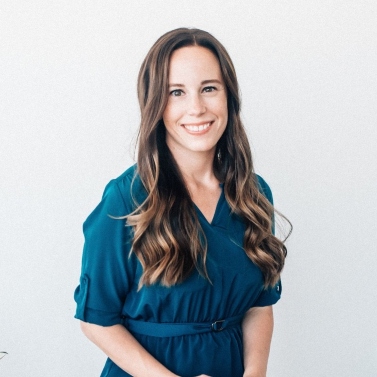
Yasmin Johnston
Yasmin Johnston, Certified Pediatric Sleep Consultant, and Founder of Mindful Sleep Consulting.
Pause, Communicate, and Swaddle
Newborn sleep is unpredictable. Their sleep cycle lasts 20-40 minutes and they need to be fed every two to three hours. It can be difficult to navigate! Naps can be short and the nights will seem long with all the broken-up sleep.
One of my best tips is “the pause.” Babies will wake between sleep cycles. We all naturally wake between cycles, it’s just that we adults have learned how to quickly get ourselves back to sleep. What about when the baby has its eyes closed but is moving around and making noises? That is the first stage of the sleep cycle, the active stage, where the baby may seem awake, but they are actually asleep. During situations such as these, when we pause and give our babies a minute or two, they often times fall back to sleep! If we rush in at the first sight of movement or a sound, we run the risk of truly waking them up and cutting the nap short. The pause can be very powerful!
Another great tip is to have open communication with your partner. These short breaks when baby naps or the small stretches of sleep you get at night are hard to manage. Coming up with a plan on how to prioritize your own sleep, such as taking shifts during the night, can ensure each of you gets at least a 4-6 hour uninterrupted stretch of sleep.
Swaddles and wake windows are also incredibly helpful! The swaddle helps your baby feel comforted and cozy, just like on the inside. It also helps to reduce the Moro Reflex (startle reflex), which can cause the baby to jolt awake. Using a swaddle can help your baby to take longer naps. Wake windows are key for ensuring your baby does not become overtired. Follow age-appropriate wake windows to help your baby fall asleep easily for naps and bedtime.
Any Baby Can Become a Great Sleeper
First, take care of yourself the best that you can! The advice to “sleep when the baby sleeps” isn’t bad, but it’s very difficult to follow, especially when you are busy trying to keep up with all the demands of life and caring for a baby. So ask for help, accept help, and give yourself some grace! It’s okay if the meals aren’t homemade and the house isn’t always clean.
Let yourself off the hook and take people up on their offers to help! Allow friends and family to bring meals, do laundry, and take care of your baby while you sleep or engage in self-care. Running on empty won’t benefit anyone, so take time to fill your cup and don’t feel guilty about it!
Second, help your baby become a great sleeper so that your whole family can get the sleep that you need. With some loving guidance, healthy babies can learn to fall asleep by themselves at or before four months of age and can sleep through the night by six months of age.
Many well-meaning people will tell you that your baby simply isn’t a good sleeper and there’s nothing to be done about it. But nothing could be further from the truth! Some babies are naturally great sleepers and others aren’t, but all healthy babies can become great sleepers.
You can guide them through this process using a variety of gentle and loving methods, so don’t ever believe the myth that “cry it out” is the only way to get your baby sleeping through the night. If you’re not sure where to start, don’t hesitate to reach out to a certified sleep consultant. These professionals are trained to help you get your little one sleeping well using only methods that you are comfortable with and that will truly work for you, your baby, and your family as a whole.

Emily Lau
Emily Lau, Certified Infant and Pediatric Sleep Consultant at Beautiful Beginnings Consulting.

Funke Afolabi- Brown
Dr. Funke Afolabi- Brown is a speaker, educator, writer, and founder of RestfulSleepMD.
Teach Them to Sleep Independently
Sleep tip on handling short naps in newborns.
1. Realize that short naps are common in newborns. Their naps can range anywhere from 20 minutes to 120 minutes.
2. Start working on consolidating their nighttime sleep by helping them fall asleep independently by putting them in their crib drowsy but awake.
3. During the day, continue to offer periods of naps and maintain a schedule of feed/play/nap. You can attempt to offer a nap after about every 60 to 90 minutes of being awake and increase this as they get older.
4. Watch out very closely for sleepy cues and offer a nap once you start observing them.
5. Get help from a partner, family member, or neighbor so you can get some rest yourself.
Help Your Baby Sleep Longer
Sleep patterns vary in infancy. Compared with adults, babies have shorter sleep cycles. Also, babies have longer periods of light sleep compared to adults. Infants under six months of age have less organized sleep. Catnaps, a sleep of 20-50 minutes, are common in young infants.
Several strategies may promote longer sleeps:
● Having a recurring pattern of getting ready for bed is helpful. This includes bathing, cuddling, reading, singing, or soft music.
● Putting your baby down to sleep when they are drowsy instead of completely asleep may help the baby learn to self-soothe.
● Using a pacifier may also help with sleep.
● If your baby wakes up, keep the room dimly lit. This conveys the message that it is sleep time instead of time to wake up and play. Instead of picking her up right away, first try gentle humming, singing, or patting to see if she will settle.
● “Cry it out” methods are controversial. Generally, these methods should be tried in older infants (greater than four to six months old). Remember crying is a baby’s way to communicate that they may need a diaper change, eat, as well as be picked up.
● Some young babies also have colic and extended periods of crying in the evening. Following the five S’s can be helpful. The five S’s include
1. Swaddling
2. Side or stomach position while being held
3. Shushing sounds- white noise
4. Swinging or rocking and
5. Sucking a pacifier.
Sleep deprivation is a reality for new parents. It is also important to practice self-care. If your baby is inconsolable despite trying everything, it is best to put the baby down in a safe place and take a time out for a few minutes.

Pierrette Mimi Poinsett
Dr. Pierrette Mimi Poinsett, MD, Medical Consultant at Mom Loves Best.
If you would like one-on-one help for cultivating healthy sleeping habits in your infant or toddler, contact us at Tiny Transitions. We’ve helped thousands of families create sustainable sleep solutions and can do the same for you.
This is a crowdsourced article. Contributors’ statements do not necessarily reflect the opinion of this website, other people, businesses, or other contributors.
